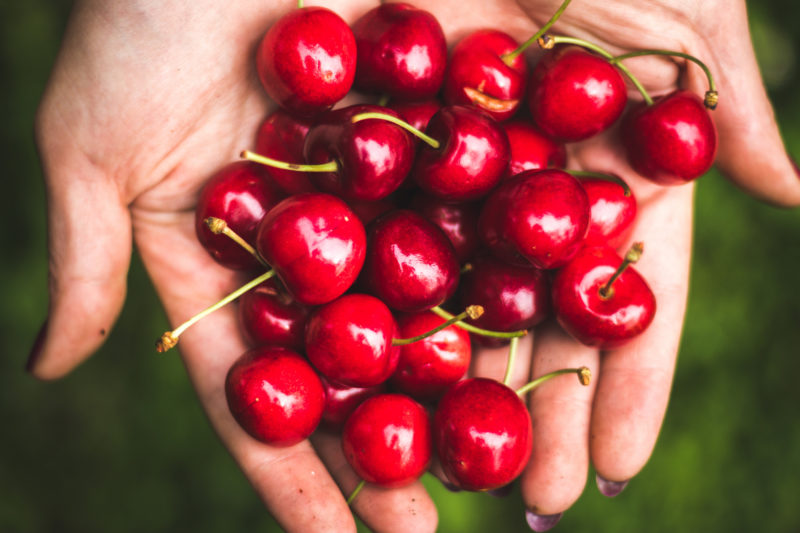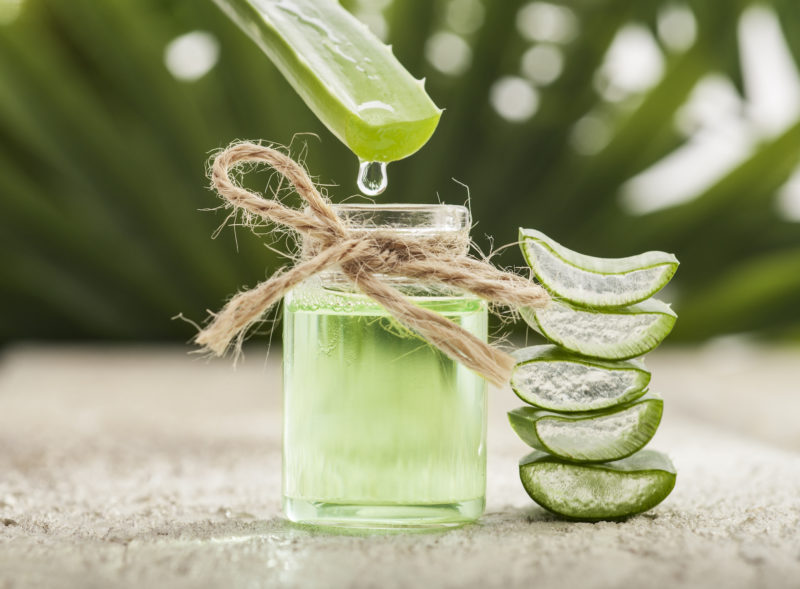The underrated fruit doesn’t get the love it deserves.
Yes, it’s the better-tasting cherry (we love a little zing), but it’s also loaded with nutrients. These nutrients make it especially beneficial for the average person. Like apple cider vinegar, this may be something you want to work into your daily life.
Why? Well, because it can help with something we all hold dear to our hearts — SLEEP. That’s right: nutritionists connect this dark red beauty with better sleep. But that’s a little vague, right?
Vague, yes, but still true. In fact, science supports these babies and makes a case for their role in daily life.
Let’s take a look at some of the evidence.
Tart Cherries and Improved Sleep
They can help increase melatonin levels.
This body chemical is sometimes confused with melanin, which is a skin pigment. They’re not related, so there’s your FYI — don’t be that person. Instead, this molecule helps regulate sleep. How so? Well, your body produces an increased amount of this towards your bedtime. Production helps lull you down and eventually, knocks you out for the night.
So, if your eyes feel a little heavier as the sun goes down, now you know why. Melatonin helps control your circadian rhythm. No, that’s not a Fortnite dance the kids are doing; it’s the process that your body uses to rest. Think of it as your internal clock that usually follows the day cycle. The sun goes down and you’re ready to catch some z’s, the sun comes up and you’re ready to go.
At least, that’s how things are supposed to work. Yet, many of us still lay awake at the wee hours of the night. Then we drag our knuckles throughout the morning like a zombie looking for brains. Instead, we’re not looking for brains, we’re hoping for our pillows.
That’s where supplements come in. Many look to pills and potions to help them remedy bedtimes issues. For those who would like a more natural supplement, that’s where tart cherries come in. Medical studies have shown this cherry can help increase melatonin-production. In fact, one European Journal of Nutrition study showed measurable changes.
The double-blind study followed 20 volunteers over 7 days. Participants drank either tart cherry juice concentrate or a placebo. Researchers collected urine samples, testing for signs of the molecule.
And what did they find? Surprise, surprise: the cherry drinkers melatonin-content increased, while the placebo showed no change. What does the increase mean?
That brings us to our next point…
Cherry concentrate can help boost sleep efficiency.
Again, it sounds vague, but it’s still true. The European study didn’t just tally chemical-ranges, it accounted for sleep quality too. Volunteers answered sleep quality questionnaires and special sensors monitored actual sleep. Both methods showed the same thing — people slept better with daily doses of the concentrate. More accurately, they slept for longer hours in this case.
Researchers in Spain found a similar correlation in a 2013 study. Ages for this placebo-controlled study ranged from 20 to 85-years-old. Across all these ages, participants showed measured success. Those who drank tart cherry concentrate daily showed reported better sleep. Their activity patterns exemplified this: less sudden awakenings during sleep and more shut-eye.
The report also focused on sleep latency, which means how long it takes to fall asleep. Can you guess what happened? Yup, participants reported (and data showed) falling asleep quicker during their trial. Falling asleep easier and less instances of randomly waking up at 3 AM? Count us in.
This sour fruit’s potential effectiveness has many in the health world. That brings us to our next point.
It may able to help those with sleep disorders in the future.
If the tart cherry can benefit the average person’s sleep cycle, can it help those with sleep disorders? Signs are looking positive, but lack extensive research. Research might be far and few between, but there’s still hope.
The American Journal of Therapeutics recently published a pilot study focusing on patients with insomnia. Researchers hoped the fruit could one day be a natural alternative to sleep-inducing drugs. So, is that what they found?
Unfortunately, the correlation could not go that far. But, those who ingested a cherry concentrate daily (as opposed to the placebo) found improvement. Their monitored sleep time increased by a little over an hour and thirty minutes (83 minutes). We know every minute counts, so that’s pretty cool.
Interestingly enough, researchers also noted an increase in tryptophan-availability. This chemical helps your body produce the mood-enhancing neurotransmitter serotonin. This makes sense because serotonin is also associated with melatonin. Think about it like this: how many times has your night’s rest (or lack thereof) affected your mood the next day?
A Very Cherry Recipe
Enticed? Of course you are. Here’s a fun little way to get some cherry-love in your life. Use our Organic Tart Cherry Extract to create this refreshing recipe.
Tart Cherry Red Wine Spritzer
Wine and cherries are two of our favorite things, so naturally we love this recipe by Running to the Kitchen. Add seltzer in the mix and a rosemary for garnish, and you got yourself a holiday drink (or any time, really).
Looking for more tasty drinks? Check more recipes here.
Bottoms up!
Walking down grocery store aisles, you are bound to come across something with aloe in it, from drinks and food to hair care and lotions. It would actually be shocking for you to not find something that is related.
At this point, you have to wonder, is it all hype? Can the plant really do what people say it can do?
Let’s take a deeper look at some of the most popular theories.
It is said to help with acne.
Because aloe vera contains antioxidants and vitamins, it is believed to help protect skin. But does this translate to a reliable acne treatment?
One study published in the Journal of Dermatological Treatment suggests this is, indeed, true — at least for the gel.
Researchers created a topical ointment made up of tretinoin and the gel for mild to moderate acne. 60 subjects were studied; some were given the first treatment and others were given a different formula.
The gel formula had positive feedback, being described as “well-tolerated” and “significantly more effective” than the other treatment.
That’s pretty cool, right? But why do researchers think that it worked?
Well, the plant can help naturally support the body’s response to inflammation. This is due to to its polysaccharide content that helps reduce the promotion of prostagandin synthesis and leucocytes.
And remember, acne is a type of inflammation, the tale-telling symptom being red, inflamed skin.
More study is needed for other more aggressive forms of acne, and if the gel can be used on its own as a topical ointment.
It can help promote clear skin and anti-aging.
Okay, this one definitely sounds like a stretch, right? Anti-aging? Yeah, right.
But knowing how the gel can be beneficial for acne, it may be a little easier to understand where theories about where this idea originates.
But does this theory actually hold up?
Well…potentially, yeah!
Specific polysaccharides from this plant’s gel, called mucopolysaccharides, support skin moisture and the appearance of wrinkles. Other phytonutrients, including amino acids, also help encourage skin elasticity, which promotes softness.
So, maybe aloe can’t turn back time, but it can help the skin appear younger. One study published in the American Journal of Infection Control explored this benefit.
The study focused on assembly-line workers (30 women) who had occupation-related, dry and irritated skin. They were subjected to wearing gloves that were outfitted with aloe vera for multiple hours of the day, for 30 days.
So, was the experiment a total bust? Nope!
Researchers found that the subject’s skin had improved, with decreased appearance of fine wrinkling, dermatitis and dry skin.
Aloe vera can help hydrate.
Moving along from the benefits of topical gel, let’s look into oral consumption. Drinking its juice, or water mixed with the juice, is thought to help support hydration.
On this side of the spectrum, research becomes a little more sparse. Much of the benefits of consumption can be attributed to anecdotal evidence, which doesn’t sit right with everyone.
So if that’s not your thing, this benefit may be a “no-go.”
Healthline reports that this consumption can help promote healthy hydration, primarily due to the spiky plant’s naturally water-density. That makes sense, especially as the juice is described as “refreshing.”
The health authority also goes on to say that the juice may be a good way to rehydrate after workouts, specifically because more fluids are needed to help decrease lactic acid afterward.
But like coconut water, more research would be necessary to confirm hands-down, although it wouldn’t hurt to try.
It can help with digestion.
Oral consumption is also said to also help with digestion. This is because the green plant holds specific enzymes that aid in breaking down sugars and fats, which support smooth digestion.
Its water content has also been seen as an asset for digestion. Healthline suggests that increasing water content in the intestines can help stimulate peristalsis, which also supports smooth digestion.
So, if you’re having a little stomach distress, a swig of aloe juice/water could help do the trick. In fact, one double-blind study found that its laxative-like property helped relieve constipation.
Studies have explored how this digestive support affects disorders and diseases, like irritable bowel disease (IBD) and ulcerative colitis, but more study is needed to determine it exact efficacy. So far, it’s a mixed bag: some people have reported improved symptoms; however, others says there’s no effect.
It could help support immunity.
Aloe vera is sometimes is seen as a “superfood” or “miracle” food due to its many properties, especially due to its supposed ability to help support the body’s immune system.
So, where does this theory stem from?
This green and refreshing plant contains special antioxidants called flavonoids, tannins and carotenoids, which may help support the body’s response to oxidative damage. By doing so, this can help the immune system properly function at its best.
The plant’s enyzmes may also help support nutrtion absoprtion, which can help support immune response.
Ready for a Taste?
Interested in seeing what all the buzz is about? Give our aloe vera products a look on PurePlanet.com.
Sources and More Info:
https://www.healthline.com/health/food-nutrition/aloe-vera-juice-benefits#1
https://www.ncbi.nlm.nih.gov/pmc/articles/PMC2763764/#CIT7
http://www.mdpi.com/1420-3049/13/8/1599/htm


